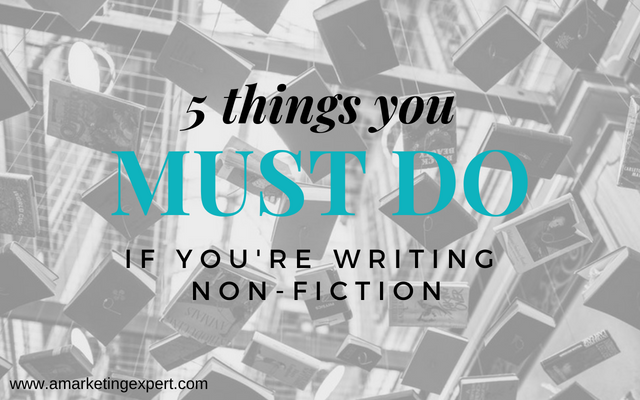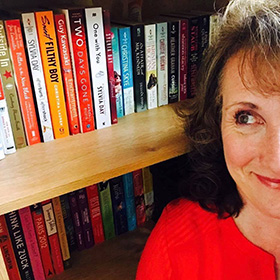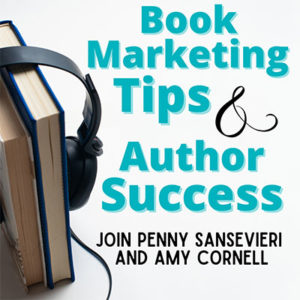Writing non-fiction books is a great way to bolster your platform, build your email marketing list, grow your business, and get speaking gigs but it also requires a different approach to typical book marketing strategies.
Non-fiction books, and the associated book promotion, requires a bit more effort than writing and marketing a fiction book does.
To be blunt, nailing down the right non-fiction book marketing strategies is a whole different animal. Let me explain.
Are You a Topic Expert?
Years ago, I had a gal who wrote one of the first books on plant-based, protein eating as a way of life. She wasn’t an expert, but her dad had suffered a heart attack and she put him on this strict diet, which helped his heart health greatly. The problem was, she was no credentialed expert.
That’s a big problem when it comes to writing non-fiction, you may think you’re an expert, but are you really? Some topics, like dieting, health advice, money advice, etc. really require that you have some sort of foothold in that industry. Maybe you worked as a financial planner for years, or you’re a nutritionist, or a therapist offering relationship advice. All of these things can really help to bolster the credibility of your book (and your associated non-fiction book marketing strategies), without them, you might need to get some help.
What If You Aren’t an Expert?
If you want to write a book on a topic you’re passionate about, go for it, but you’ll need to make some changes if you want to be taken seriously.
The problem is, that anyone can write a book about anything. You don’t need to be an expert or have any credentials. The problem is if you don’t have credentials, or you aren’t an expert, your book probably won’t get much attention and your non-fiction book marketing will suffer because of it. There are just too many other books out there that you’re competing with. So, what can you do?
Well, let’s go back to the author I mentioned earlier, who wrote the plant-based food book. When she realized what a struggle this was going to be without the proper credentials, she realized she needed to incorporate book marketing strategies that filled this gap for her. She went after doctors and nutritionists who could endorse her book.One of them even wrote the foreword to it. So sometimes it’s that easy. In other cases, you may need to co-author the book, if it’s a really complex topic. I’ve written about connecting with influencers before and included the link in the Resources section at the end of this piece.
If you can’t get endorsements before you launch it, then maybe it’s time to up your authority game. Meaning you need to become more of an authority on this topic. Lend your voice to whatever you’re writing about, beyond the book itself. We’re going to cover that next.
Choose Book Marketing Strategies That Make You An Authority
Whether you’re an accredited expert or not, you still need to act like one. What does that mean? Well, let’s start with blogging. If this is going to be a passion project for you, then you should be passionate about the topic as well. Meaning: you should be blogging on it. As a book marketing expert I can tell you that whether I’m pitching a book to bloggers or media, they’ll want to know what the author’s expertise is. If you aren’t credentialed on the topic you’re writing about, then you’d better be blogging on it – a lot.
The other piece of this is your social media, because while you don’t have to be on every social media site, you should be active on at least one or two of them. Your activity in any of your book-related social media accounts should tie into your topic. (Not sure which social media channels are right for you? Take our quiz listed in the Resources section.) You can feed off of current events, changes in your market, new trends, or even celebrity news, if it fits your topic. All of these are great fodder for your non-fiction book marketing toolkit. Let’s look at a few examples.
I recently spoke to an author who deals with conflict issues. Whether you don’t get along with a boss or co-workers, or you’re in a combative personal relationship, they cover all of these bases. When I consulted with them, they were eager to find new ways to spread their message and enhance their book marketing. So I suggested the following:
- Talk about the news, what’s going on in the world and how politics has become such a high conflict area.
- We’re getting close to the holidays and already people are thinking about, and making plans for Thanksgiving. That’s the one time of the year when you get to spend a few hours with family, some of whom you haven’t seen in a year or more. And there are some, you flat out don’t get along with. So why not speak to that?
See what I mean? Now we’re looking both short term and long-term when it comes to finding topics to blog about, or reference on social media.
Become the Expert/Know Your Market
Along with being an authority, it’s also important to own your expertise. And while the term “expert” doesn’t feel comfortable to a lot of people, you should embrace this. Why? Because expertise will separate you from the pack and again, it’ll help to bolster your book marketing strategies. Get to know your market/specialty as best as you possibly can. Read up on your market, stay alert to trends, changes, or things that might be coming down the road.
People always call me an expert, and I’ve spent a lot of time working toward that. But I’m not schooled on publishing, per se. My background is marketing, but becoming an expert (one of many) on publishing was crucial to not only our authors, but the book marketing plans we develop. It’s important that our authors know that if they work with us, I’m not just focused on their marketing, but the publishing industry which drives a lot of book marketing changes.
And you’ll notice that a variety of industry experts do this. Meaning they will focus not just on their industry, but industries that affect change.
Becoming an Expert Funnel
When it comes to non-fiction book promotion, it’s a lot easier to market someone who is an “expert funnel.”
I used to say this a lot, when I was speaking to a variety of business groups who were focused on writing non-fiction. Becoming an expert funnel is essentially what I just talked about. So what’s an expert funnel? It’s a person who filters all of the information on your industry, and funnels out what matters to your core audience. So when readers go to your website, they get what they need. Nothing more, nothing less. Consumers love that. Which is why bloggers tend to stay hyper-focused on their niche, because that’s how they build a dedicated following. And, as I mentioned early on, it’s a fabulous way to bolster your non-fiction book marketing.
Part of being an expert, is staying focused on what’s going to change in your industry. And this is important not just because you need things to talk about on your blog or in social media, but also because these trends can affect what you’re writing about. The book you are producing (or any future books, for that matter) should be as current as you can make them. If possible, there will also be a nod to future trends, or things that may affect some of what you’re talking about in your book. Not only will this help you to produce a great book, but you’ll become the go-to person (or one of them) for your topic. You’re becoming an expert funnel. And yes, all of this will help your book marketing campaign, but it can also extend your message.
Consider this: would you rather be a person the media goes to one time for a story, or the expert they call upon again and again? See what I mean?
I know all of this probably sounds like a lot of work. And I won’t kid you: it is. But it’s a lot harder to produce a book that isn’t selling.
A lot of authors think that a good book marketing campaign will help them grow their expertise and that’s true, up to a point, but you can’t show up with an empty bucket hoping that whatever book promotion you’re doing will fill it. The media has a lot of choices these days, a lot of eager authors vying for their attention. To get seen and heard, you need to be an expert and you need to be focused on book marketing strategies that add a lot of value toward achieving your goals.
Don’t put all of your effort into a book, thinking that’s the only thing you need to do because books require consistent care. And while the requirements for fiction and non-fiction book marketing differ, in terms of the work you’ll need to invest, it’s all an investment in your book marketing. Not only will this effort help you with your current book, but if you have future books, or if your book is your business card, you’ll reap bigger rewards, and better benefits if you zero in on your book expertise, and own the marketplace.
What are some ways that you’ve demonstrated your expertise as a non-fiction author? Let us know in the comments!
Resources and Free Downloads
Social Media Quiz – Which Platform is Right for You?
Starting an Author Blog the Right Way





This article was great. I felt it was extremely informative. My first nonfiction book will be coming out soon, so I need all the help I can get with market.